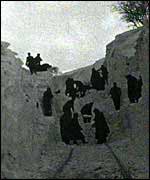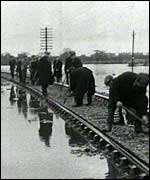|
The snows of 1947
Mary Ferguson now lives in Beverley but as a young woman she travelled
from Driffield to Malton on a wild winters night in 1947.
The following is taken from her account of the journey.
Mary Ferguson waited at Driffield for the 'Malton Dodger'
train, so called because of the winding rail track between Malton and
Driffield.
It was scheduled to leave Bridlington at 7.00pm, and
arrive at Driffield at 7.30pm.
The train was late arriving at Driffield station. The
guard ushered her on board stating that he had thought the train would
be stuck in the drifts.
Snow continued to fall heavily and eight miles from Driffield
it lurched and stopped dead, stuck in a snowdrift.
The Eye of the Storm
The guard came along urging the passengers to make themselves
comfortable saying,
"... We may be here tomorrow at this time if this
continues."
The Blizzard raged. The train was in open country with
no trees for shelter. The snow drifts deepened.
The guard came back, knee deep in snow, asking how many
passengers for York. When he learnt there were three passengers, he said,
"The train is being held at Malton for you. That
is if we get out of this mess".
Some minutes later he informed them the train had gone
on to York, because there was no sign of their release, and it could not
wait any longer.
Blizzard Conditions
The driver, fireman and guard tried their best to dig
out the train, but the more they moved the snow from Dodger's wheels,
the more the blizzard sent it down.
To make matters worse, Dodger was not a corridor train.
The passengers could not stretch their legs, and there was little heating.
 |
| Rail workers clear snow drifts off the line |
Eventually railwaymen from Malton reached the snow bound
train with a rescue engine, a snowplough and shovels.
At 3am the train moved, was set free and at 4am steamed
into Malton station.
The passengers for York were making for the waiting room
when a voice called out,
"Passengers for York, your train is standing at
platform four."
LNER had not forgotten its stranded passengers.
At York, they were met by three railway officials giving
them the freedom of the buffet, and taxis to their journeys' end.
Then the floods...
The whole of the Yorkshire river system was flooded in
the spring of 1947, and to a historic height.
There is a plaque on the York City Wall near Tower Street
which records the level of historic floods.
To discover one which reached a higher level than 1947,
it is necessary to go back to 1831.
 |
| Railway tracks were flooded throughout the North |
Railway officials described the situation as 'chaotic'
and 'disorganised'.
Passengers on a Peterborough-Rugby service were stuck
overnight and could not be rescued until 9am the following morning.
On the LNER main line the night 'Aberdonian' expected
at 5.40am arrived in Peterborough at 10am.
Most trains from the north did not appear until the afternoon.
LNER experimented with a jet engine mounted on a wagon
to clear the line but found it also blew the ballast away breaking windows
in signal boxes and railway huts as well as destroying fences!
The cause of the Yorkshire floods in 1947 was an exceptional
fall of snow in the hills during the first quarter of the year, and a
sudden thaw during which all the accumulated water ran off into the rivers.
High seasonal tides did the rest!
Useful Contacts
Yorkshire Film Archive - 01904 716 550.
|

